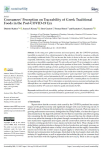Skalkos D., Kosma I.S., Chasioti E., Bintsis T., Karantonis H.C. (2021). Consumers’ perception on traceability of Greek traditional foods in the post-COVID-19 era. Sustainability, 15/11/2021, vol. 13, n. 22, p. 1-17.
https://doi.org/10.3390/su132212687
https://doi.org/10.3390/su132212687
| Titre : | Consumers’ perception on traceability of Greek traditional foods in the post-COVID-19 era (2021) |
| Auteurs : | D. Skalkos ; I.S. Kosma ; E. Chasioti ; T. Bintsis ; H.C. Karantonis |
| Type de document : | Article |
| Dans : | Sustainability (vol. 13, n. 22, November 2021) |
| Article en page(s) : | p. 1-17 |
| Langues : | Anglais |
| Langues du résumé : | Anglais |
| Catégories : |
Catégories principales 08 - ALIMENTATION ; 8.1 - Consommation Alimentaire. ComportementThésaurus IAMM PRODUIT REGIONAL ; COMPORTEMENT DU CONSOMMATEUR ; COVID-19 ; TRACABILITE ; CULTURE TRADITIONNELLE ; EDUCATION DU CONSOMMATEUR ; QUALITE ; MATERIEL DE CONDITIONNEMENT ; GRECE |
| Résumé : | In the rising new global economic and social period, after the COVID-19 pandemic, traceability is expected to be a critical parameter for the selection of foods by consumers worldwide. Accordingly, traditional foods (TFs) can become the foods of choice in the new era due to their originality, authenticity, unique organoleptic properties, and locality. In this paper, the consumers’ perception on traceability regarding Greek TFs and northwest Greek TFs is investigated, in order to find out the specific information they require for the purchase of these foods. Traceability was tested using variables related to package, product, quality, process, and personal information of these foods. A self-response questionnaire survey was carried out in September and October 2021 on a sample of 1707 participants through the Google platform. The results show that the participants consider traceability regarding questions on package information “quite important” and “very important” by an average of 68%, on food information by 64%, on quality information by 69%, on production process information by 78%, and on personal information by 65%. A similar pattern was recorded for the regional northwest Greek TFs for information on production process, personal, and package data, although there was a significant increase in the perception by the participants for data related to food information itself by 87% and more related to quality information by 94%. |
| Cote : | En ligne |
| URL / DOI : | https://doi.org/10.3390/su132212687 |







